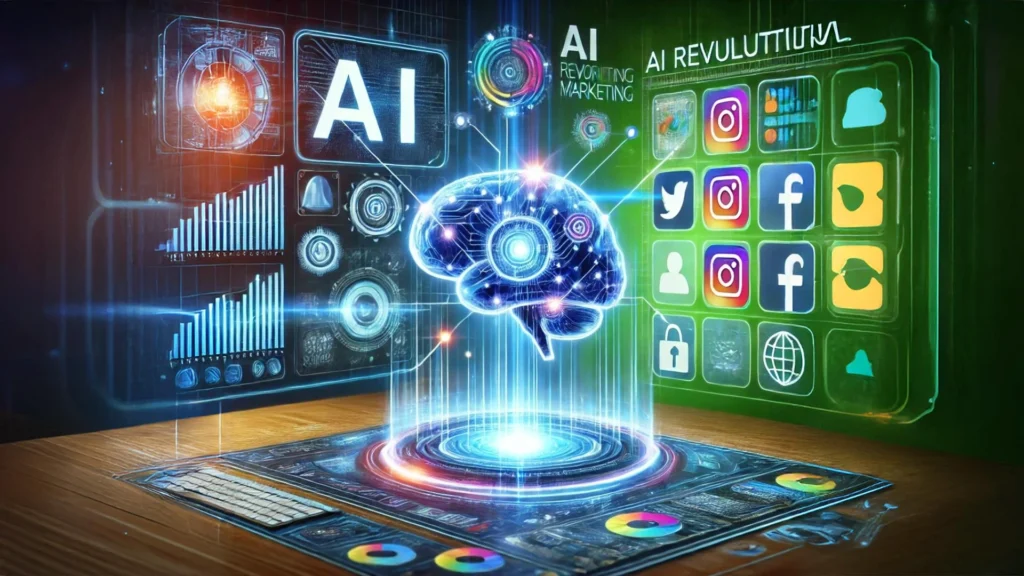In today’s world, content is overflowing, which makes standing out harder than ever before. Every time we log in, we are bombarded with notifications, posts, reels, shorts, and ads at every scroll. Yet, what makes our heads turn is relevance, unique voice, and content that speaks directly to an individual’s needs and emotions. This is where AI-powered content creation and personalization are reshaping the future of marketing.
From Automation to Intelligence
Artificial Intelligence has evolved far beyond simple automation. Which were simple tools to create schedules or correct grammar till yesterday have now grown into systems capable of algorithmic content generation and adaptive storytelling today. With the rise of generative AI and machine learning models, brands can now create and adapt copy and visuals according to the specific needs of their target audiences.

Modern NLP (Natural Language Processing) models allow AI to understand tone and sentiment in human language. This means a single concept note can create multiple versions, each resonating with a specific kind of audience. For instance, a brand can have AI tailor its message differently for a student in Delhi, a corporate professional in Mumbai, and a retiree in Lucknow, all while maintaining the same brand voice at its core.
This marks a shift from creating content at scale to creating content that scales meaningfully.
The Power of Predictive Personalisation
One of AI’s most exciting abilities lies in predictive personalisation. By analysing patterns in user behaviour and browsing history, AI can forecast what a user might want next. The name of the game is anticipating intent.

Because of this, the entire game changes for marketers. Instead of generic campaigns, data-driven personalisation makes hyper-personalised marketing possible, where every piece of content, from emails to social media ads, adapts dynamically based on who’s viewing it. From Netflix’s recommendations and Spotify’s playlists to Amazon’s product suggestions, all stem from powerful recommendation systems built on predictive analytics and user profiling.
In essence, AI is tailoring content and also predicting desire, which is revolutionary in itself.
The Rise of Content Intelligence
At the heart of this revolution, the ability to use AI to understand what type of content works best for which audience, and why, happens to be the greatest gain for marketers. Through user behaviour analysis and real-time content optimisation, brands can now measure engagement and strategise on the fly.
Imagine publishing a blog post that changes tone or even examples depending on who reads it. Or an e-commerce site where product descriptions rewrite themselves in real time to match a customer’s browsing intent. This isn’t science fiction; it’s the promise of dynamic content delivery powered by personalisation engines.
Such systems use continuous feedback loops to learn what resonates most with specific audiences. The more data they consume, the smarter and more intuitive they become, a never-ending cycle of understanding and adaptation.
AI-Driven Creativity: The Human-AI Partnership
There’s a common fear that AI will replace human creativity. In truth, the magic lies in human-AI collaboration. While AI can generate endless content variations or analyse data with precision, it lacks the emotional depth, cultural nuance, and empathy that define human storytelling.

This partnership creates a new creative model. AI handles the data-heavy lifting, i.e., content automation, insights, and recommendations, while humans focus on emotion and originality. It’s like having an intelligent co-writer who never tires and constantly analyses and improves with every input.
A content strategist might use AI to identify trending topics and generate a draft Instagram post using algorithmic content generation. Then, through refinement, the human touch ensures authenticity, unique voice, and emotional connection. The result: faster production, sharper insights, and poignant storytelling.
Building Intelligent Marketing Systems

The inclusion of AI across the content creation process has given rise to intelligent marketing systems. These systems link audience profiling, automated content creation, and adaptive delivery into one seamless workflow.
Picture this: A brand launches a new campaign. AI analyses customer data, creates multiple ad copies, predicts which versions will perform best for each demographic, and then delivers them through personalised channels. As engagement data flows back in, the personalisation engine adjusts copy and visuals in real-time. No manual tweaks or guesswork, just machine learning at its optimal best.
This shift from static campaigns to dynamic ecosystems allows brands to stay relevant in a fast-changing digital world. Every touchpoint becomes smarter and more aligned with the user.
Challenges and the Road Ahead

Of course, the rise of AI in content creation brings challenges like plagiarism, ethical use, data privacy, and maintaining authenticity. AI is not the future anymore; it is an evident reality of today. So, as AI-driven creativity becomes common, the responsibility to ensure transparency and trust also grows. Overreliance on automation can make content feel soulless; it absolutely has to be balanced with human supervision.
However, when used thoughtfully, AI can amplify human creativity. The goal is to empower the storyteller, not to replace them, to give creators tools that extend their reach, insight, and impact.
The Future: Stories That Evolve with You
The future of content is not static. It’s alive and shaped by each interaction. In this future, no two users will experience a story in the same manner, because every story will adapt to who they are.
Through the synergy of machine learning models, NLP, and data-driven personalisation, we are entering an era of storytelling that learns and evolves in real time. In the end, AI-powered content creation and personalisation are more than just technological advancements; they represent a shift in how we communicate and create meaning in today’s digital world and perhaps tomorrow’s too.
Final Thoughts

AI might seem intimidating and too complex at times, not to mention the ethical grey areas that become more and more evident with its increased use.
One thing is guaranteed, the people, especially in the content and marketing industry, who refuse to integrate AI into their processes or don’t even consider it, are going to be left behind.
So, do you want to be a part of this revolution? Or, are you still confused? Either way, we, at Third Eye Blind Productions, have the right tools to help you navigate through this complex world.

Manpreet Singh Chadha is the founder of Third Eye Blind Productions, a leading influencer marketing agency based in Mumbai. With a strong background in filmmaking and digital storytelling, he helps brands build impactful influencer strategies through creativity, innovation, and strategic collaboration.






